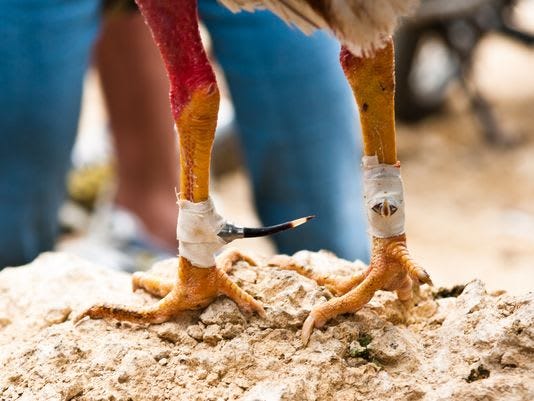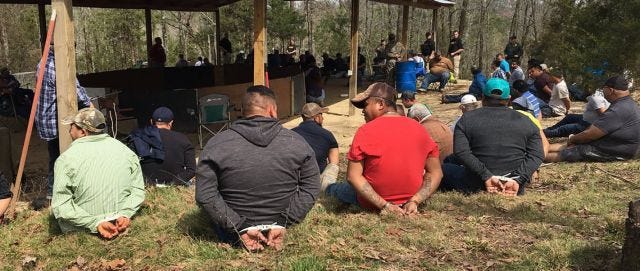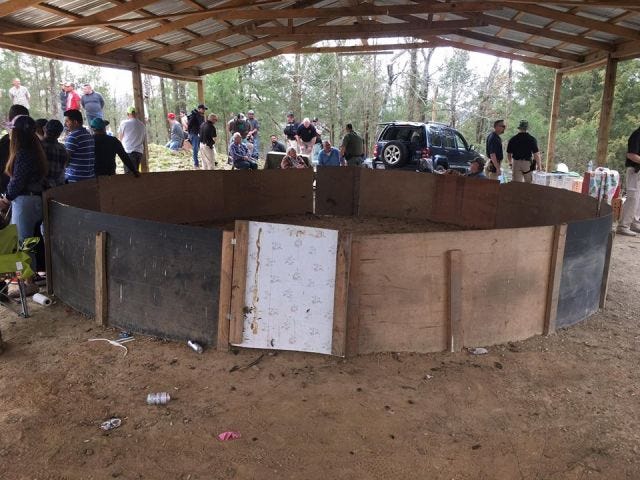Arkansas gentlemen, with and without documents

They used to call cockfighting "the gentleman's sport." This wasn't a reference to the men who raised the birds and pitted them against each other. It was a reference to the spectators, who were bound by tradition to never pass money between one another when making bets on the fights. Those who surrounded the pit would call out their bets, sealing their arrangements with as little as a nod, or eye-contact across the room. When a fight concluded, a rooster lay dead, and the gentlemen in question would approach each other and settle up their bets without complaint. Cockfighting has existed for literally thousands of years, in nearly every part of the globe, and survived despite legal prohibitions not because of the breeders and owners, but because of the attraction to the game by gamblers.
It seems fitting, then, that Hot Springs would be a center of cockfighting in the United States. As far back as 1901 Hot Springs played host to one of the largest "mains," where big money was on the line and the well-off came from far and wide to bet on them. In those days, sums on a single night reached into the hundreds of thousands of dollars, and the wealthy gamblers came from as far away as Chicago to bet. Though it went underground, cockfighting remained in Hot Springs well into the city's gambling heyday. In the 1960's it was known as "leading cockfighting center of the South," according to the New York Times. In 1963 Hot Springs was host to the "Long Heel World Series," and despite the sport being illegal, hosted over 5,000 spectators for a week of fights. And by the 2000s, after gambling had been banished from Hot Springs and cockfighting had long been spurned by polite society and driven deep into the margins of American culture, Hot Springs was still a place where cockfighters congregated, holding their national convention there in 2002.
I knew none of this history until about a few months ago, when I started reporting a story for The RInger about a cockfighting bust in De Queen, Arkansas, about an hour and a half drive from Hot Springs. I first heard about the bust while in Hot Springs doing some work on The Vapors back in April. The local news was awash in stories about hundreds of roosters being kept in cages at the Sevier County jail. The images were ridiculous, even funny, and it felt like the news was reporting the story in an almost lighthearted way. But something in those reports caught my attention. One of the agencies listed as being involved in the arrests was the U.S. Border Patrol. That seemed off. Arkansas is 600 miles from the Mexican border. Latinos make up less than 7% of the state's population. Why were they involved in this cockfighting raid in the middle of Arkansas? I asked one of my relatives, who explained to me that De Queen was "full of Mexicans now."

After doing a little bit of digging, I found that not only was it true that Border Patrol was involved in the raid, but so was ICE, and that Arkansas United Communities Coalition, a statewide immigrants rights group, was blaming the raid on racial profiling of the immigrant community in Southwest Arkansas. That may sound to you like a capricious accusation - after all cockfighting is a reprehensible crime and this particular arrest nabbed over a hundred people - but the argument was that cockfighting was something tolerated in De Queen for a long time, popular even, and only became something that required a 50-person police dragnet after Latinos got involved in the game.
You may still be unmoved. After all, immigrants in this country are experiencing so much injustice at the hands of the Trump administration, why are we supposed to spare some sympathy for the ones who were running an illegal gambling bloodsport? Shouldn't we focus on otherwise law-abiding immigrants who are being targeted, harassed and detained? You wouldn't be wrong for wondering this. But when I traveled to De Queen to investigate what was going on there, I found much more than just some drama around a cockfighting sting. I found a community that had long been on edge about ICE and the Department of Homeland Security's presence and activity, and who had been battling with their local law enforcement officials over cooperation with them. The cockfighting sting was just the latest episode in a battle that had been building ever since the election of Donald Trump and his signing of executive orders that increased the power of ICE to detain undocumented immigrants.
The story I ended up writing isn't just about cockfighting, though it is about that. It is about the history of illegal immigration in Southwest Arkansas, the radical transformation of one small town, and the way that the Trump administration has pitted communities like De Queen against each other, not unlike the fighting roosters. Neighbor against neighbor, police against residents, worker against employer. And it's about how the only way forward that doesn't destroy the community is for those who are being pitted against each other to stop fighting one another and work together against Trump and the Federal Government - to turn on those who have put them in the pit and told them to fight.

I learned a lot while reporting and writing this story, and I hope people will give it a chance. I admit it isn't a typical canvas on which to paint a picture about the crisis immigrants in America face today, but I'm ok with not being typical. It's long, but that's because there's just so many pieces of the puzzle that have to fit together to truly understand the significance of what is happening in De Queen, and what the rest of America can learn from the residents there.
Tomorrow is my birthday, so here's what I'm asking you to do for me. First share this story on social media and tell your friends and followers how brilliant it is. Then go to this link and donate whatever money you would have spent on buying me a drink (or taking me out to dinner if you know me like that) and donate it to AUCC. They are fighting an almost impossible fight in Arkansas behind enemy lines on behalf of very vulnerable people, and they need help. Right now they are trying to raise $10,000 before September 10th in order to help Arkansas DACA recipients renew their legal status before the deadline. This process is tedious and can cost people sometimes thousands of dollars in legal fees to have a lawyer assist them in preparing their documents. AUCC wants to make sure that no dreamers lose their citizenship because they couldn't afford that help.
¡Ya basta!
David

